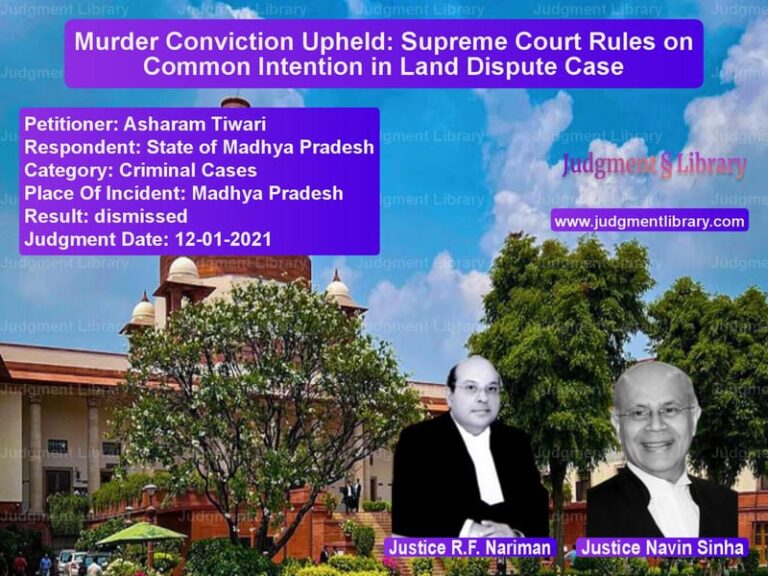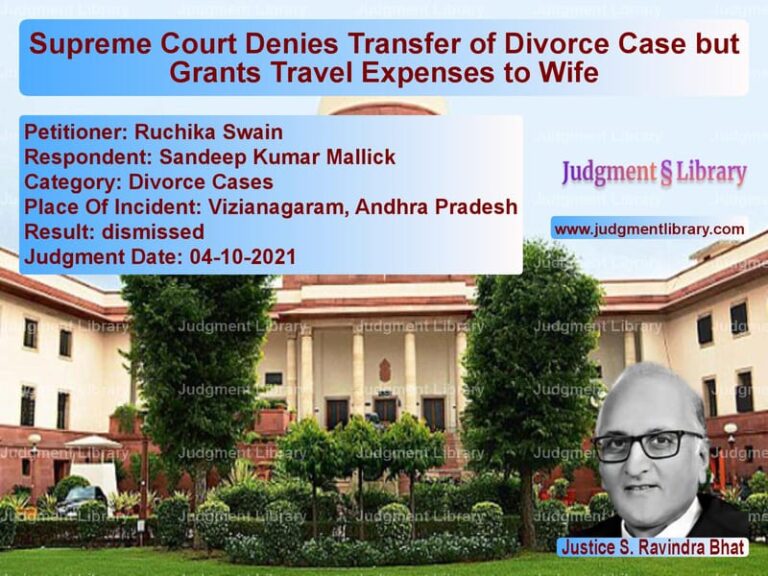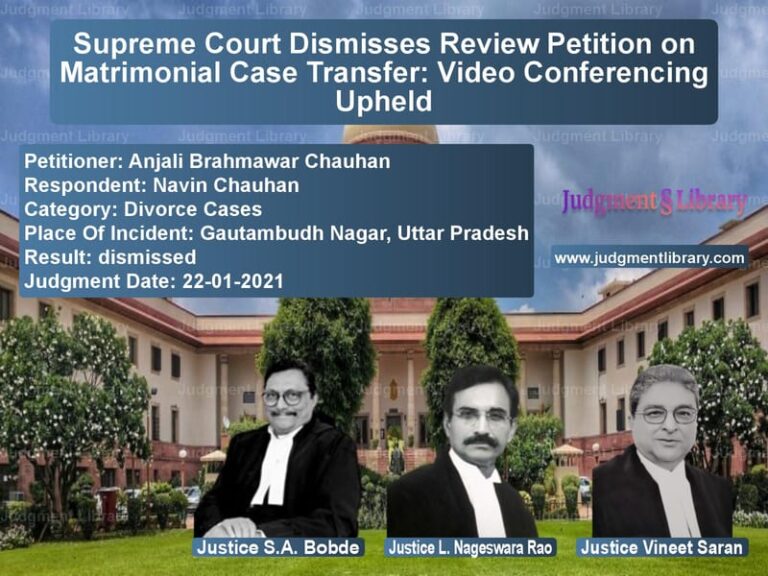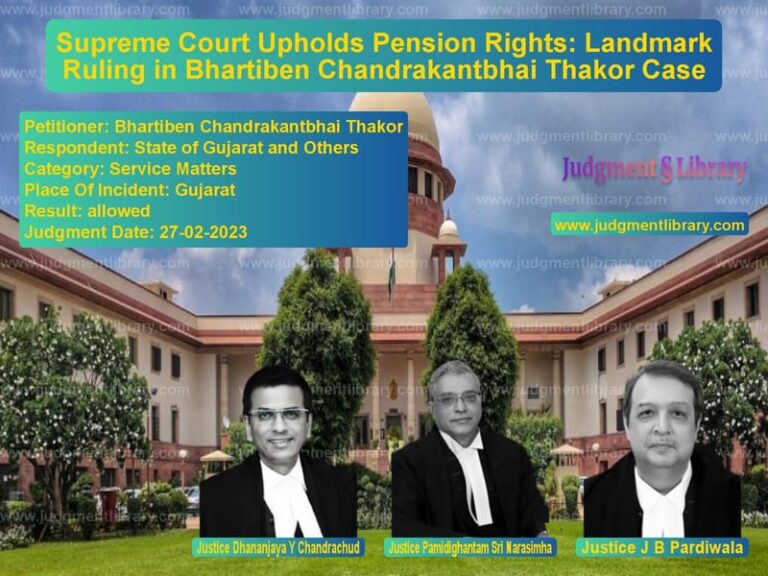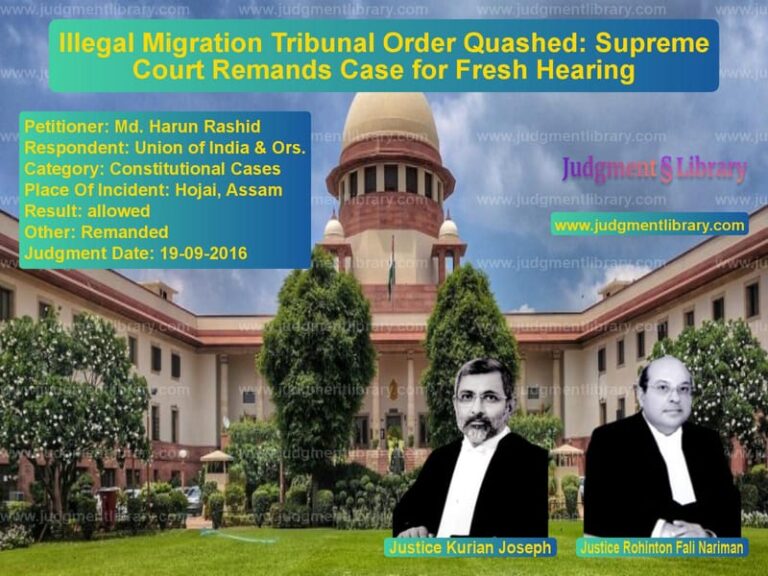Interest on Delayed Payments: Supreme Court Dismisses Review Petitions Against Assam State Electricity Board
The case of M/S Shanti Conductors (P) Ltd. vs. Assam State Electricity Board & Ors. is a significant Supreme Court ruling concerning the applicability of the Interest on Delayed Payments to Small Scale and Ancillary Industrial Undertakings Act, 1993. The case involved multiple review petitions filed against the Supreme Court’s previous ruling, which had dismissed the claim for interest on delayed payments.
Background of the Case
The dispute originated when the Assam State Electricity Board (ASEB) issued supply orders to various small-scale industries, including M/S Shanti Conductors Pvt. Ltd., M/S Brahmaputra Concrete Pipe Industries, and M/S Trusses and Towers Pvt. Ltd., for the supply of electrical equipment and materials. The supplies were made between 1992 and 1993, but payments were delayed.
The suppliers filed claims under the Interest on Delayed Payments to Small Scale and Ancillary Industrial Undertakings Act, 1993, seeking interest on the delayed payments. The trial court ruled in favor of the suppliers, but the Assam State Electricity Board challenged the decision. After multiple appeals, the Supreme Court dismissed the claims in its judgment dated January 23, 2019.
Key Legal Issues
The Supreme Court had to decide:
- Whether the suppliers were entitled to interest under the 1993 Act.
- Whether the suit filed by M/S Shanti Conductors was barred by limitation.
- Whether the petitioners could claim benefit under Section 19 of the Limitation Act, 1963, which allows for a fresh period of limitation when a payment is made.
- Whether Section 14 of the Limitation Act applied, allowing exclusion of time spent in other proceedings.
Arguments by the Petitioners (Suppliers)
The petitioners argued:
- The 1993 Act was applicable to their claims, and they were entitled to interest on the delayed payments.
- The payments were made between 1992 and 1993, and the last payment by ASEB was on March 5, 1994. Since the suit was filed on January 10, 1997, it was within the limitation period.
- Under Section 19 of the Limitation Act, the limitation period should be counted from the date of the last payment.
- The time spent in the earlier writ petition before the Guwahati High Court should be excluded under Section 14 of the Limitation Act.
Arguments by the Respondents (Assam State Electricity Board)
The Assam State Electricity Board countered:
- The suppliers had already received full payment for their supplies.
- The suit was barred by limitation as it was filed beyond the three-year period prescribed under Article 113 of the Limitation Act.
- The petitioners could not claim benefit under Section 19 as there was no acknowledgment of debt by ASEB.
- The benefit of Section 14 was not available as the writ petition was filed by an association, not by the individual suppliers.
Supreme Court’s Observations and Ruling
The Supreme Court bench, comprising Ashok Bhushan, S. Abdul Nazeer, and Navin Sinha, dismissed the review petitions.
1. Suit Was Barred by Limitation
The Court reaffirmed its earlier ruling that the suit was time-barred:
“The limitation of the suit filed by the petitioner shall be governed by Article 113 of the Limitation Act, 1963, which is three years from the date when the right to sue accrues.”
The Court held that since the last supply was completed on October 4, 1993, the limitation period started on November 4, 1993, and expired in 1996.
2. No Benefit Under Section 19 of the Limitation Act
The Court rejected the claim that limitation should restart from the last payment date:
“For claiming benefit under Section 19, there must be an acknowledgment of debt in the handwriting of the debtor or in writing signed by the debtor. There is no such acknowledgment in this case.”
3. No Benefit Under Section 14 of the Limitation Act
The Court ruled that the time spent in the writ petition could not be excluded because the petition was filed by an association, not the individual companies:
“The plaintiff in the suit was M/S Shanti Conductors, whereas the writ petition was filed by Assam Conductors Manufacturers Association. These are distinct entities.”
4. No Interest Under the 1993 Act
The Court reiterated that the 1993 Act did not apply retroactively to payments made before its enactment:
“The supplies were made before the commencement of the Act. The petitioners cannot claim interest under the 1993 Act.”
Final Judgment
The Supreme Court dismissed all the review petitions:
“We do not find any merit in the review petitions. The judgment dated January 23, 2019, does not require any modification. The review petitions are accordingly dismissed.”
Implications of the Judgment
This ruling has significant implications for businesses and government contracts:
- Strict Enforcement of Limitation Periods: Companies must file claims within the prescribed time.
- Clear Acknowledgment Required Under Section 19: Mere payment does not restart the limitation period unless accompanied by a written acknowledgment.
- Section 14’s Applicability Is Limited: Entities filing legal proceedings must ensure that the same party pursues subsequent claims.
- 1993 Act Not Retroactive: Businesses cannot claim interest under the 1993 Act for transactions completed before its enactment.
Conclusion
The Supreme Court’s ruling in M/S Shanti Conductors (P) Ltd. vs. Assam State Electricity Board reaffirms the importance of adhering to legal time limits for claims. The judgment provides clarity on the applicability of interest on delayed payments and the circumstances under which businesses can claim exemptions under the Limitation Act.
Petitioner Name: M/S Shanti Conductors (P) Ltd..Respondent Name: Assam State Electricity Board & Ors..Judgment By: Justice Ashok Bhushan, Justice S. Abdul Nazeer, Justice Navin Sinha.Place Of Incident: Assam.Judgment Date: 18-12-2019.
Don’t miss out on the full details! Download the complete judgment in PDF format below and gain valuable insights instantly!
Download Judgment: MS Shanti Conductor vs Assam State Electric Supreme Court of India Judgment Dated 18-12-2019.pdf
Direct Downlaod Judgment: Direct downlaod this Judgment
See all petitions in Contract Disputes
See all petitions in Debt Recovery
See all petitions in unfair trade practices
See all petitions in Judgment by Ashok Bhushan
See all petitions in Judgment by S. Abdul Nazeer
See all petitions in Judgment by Navin Sinha
See all petitions in dismissed
See all petitions in supreme court of India judgments December 2019
See all petitions in 2019 judgments
See all posts in Corporate and Commercial Cases Category
See all allowed petitions in Corporate and Commercial Cases Category
See all Dismissed petitions in Corporate and Commercial Cases Category
See all partially allowed petitions in Corporate and Commercial Cases Category


